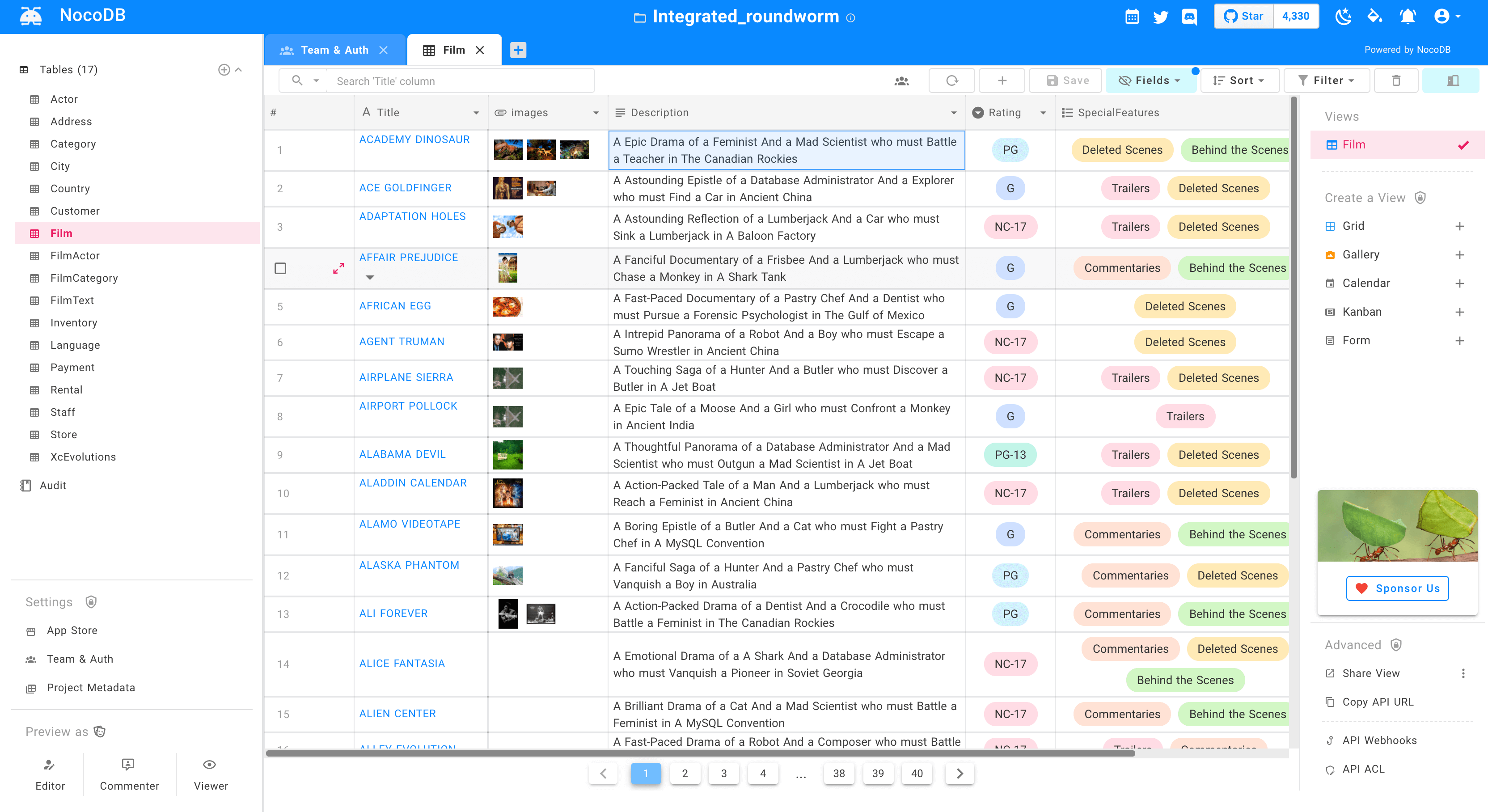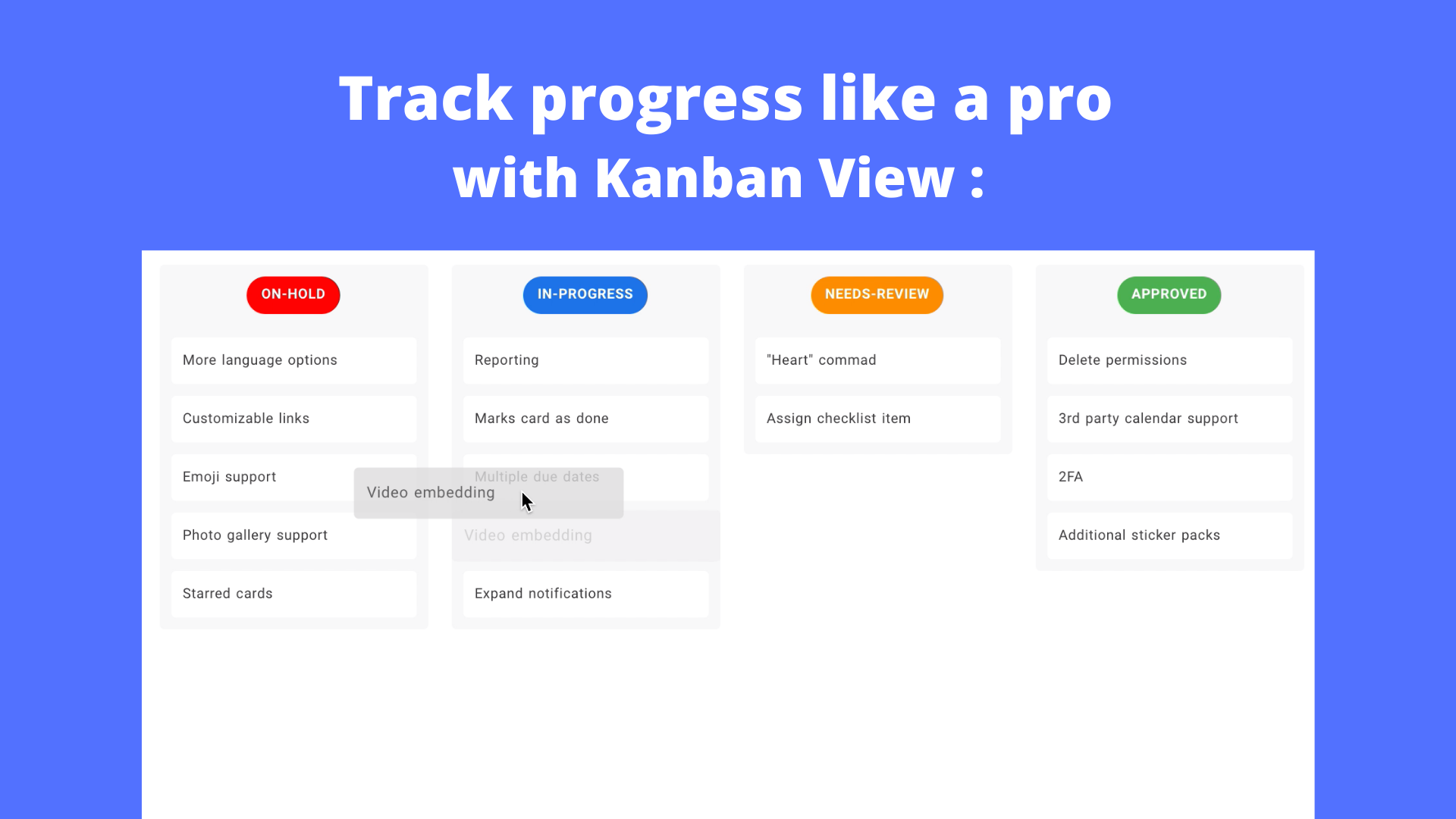|
|
3 years ago | |
|---|---|---|
| .github | ||
| docker-compose | ||
| packages | 3 years ago | |
| scripts | ||
| .all-contributorsrc | 3 years ago | |
| .gitignore | ||
| LICENSE | ||
| README.md | 3 years ago | |
| lerna.json | ||
| package-lock.json | ||
| package.json | ||
README.md
NocoDB
The Open Source Airtable Alternative
Turns any MySQL, PostgreSQL, SQL Server, SQLite & MariaDB into a smart-spreadsheet.
Website • Discord • Twitter • Reddit • Documentation


Quick try
1-Click Deploy
Heroku
Using Docker
docker run -d --name nocodb -p 8080:8080 nocodb/nocodb:latest
- NocoDB needs a database as input : Click here for production setup.
- If this input is absent we fallback to SQLite - to persist sqlite you can mount
/usr/app/data/. Example belowdocker run -d -p 8080:8080 --name nocodb -v /local/path:/usr/app/data/ nocodb/nocodb:latest
Using Npm
npx create-nocodb-app
Using Git
git clone https://github.com/nocodb/nocodb-seed
cd nocodb-seed
npm install
npm start
GUI
Access Dashboard using : http://localhost:8080/dashboard
Join Our Community

Screenshots
Features
Rich Spreadsheet Interface
- ⚡ Search, sort, filter, hide columns with uber ease
- ⚡ Create Views : Grid, Gallery, Kanban, Gantt, Form
- ⚡ Share Views : public & password protected
- ⚡ Personal & locked Views
- ⚡ Upload images to cells (Works with S3, Minio, GCP, Azure, DigitalOcean, Linode, OVH, BackBlaze)
- ⚡ Roles : Owner, Creator, Editor, Viewer, Commenter, Custom Roles.
- ⚡ Access Control : Fine-grained access control even at database, table & column level.
App Store for workflow automations :
- ⚡ Chat : Microsoft Teams, Slack, Discord, Mattermost
- ⚡ Email : SMTP, SES, Mailchimp
- ⚡ SMS : Twilio
- ⚡ Any 3rd Party APIs
Programmatic API access via :
- ⚡ REST APIs (Swagger)
- ⚡ GraphQL APIs.
- ⚡ Includes JWT Authentication & Social Auth
- ⚡ API tokens to integrate with Zapier, Integromat.
Production Setup
NocoDB requires a database to store metadata of spreadsheets views and external databases.
And connection params for this database can be specified in NC_DB environment variable.
Docker
Example MySQL
docker run -d -p 8080:8080 \
-e NC_DB="mysql2://host.docker.internal:3306?u=root&p=password&d=d1" \
-e NC_AUTH_JWT_SECRET="569a1821-0a93-45e8-87ab-eb857f20a010" \
nocodb/nocodb:latest
Example PostgreSQL
docker run -d -p 8080:8080 \
-e NC_DB="pg://host:port?u=user&p=password&d=database" \
-e NC_AUTH_JWT_SECRET="569a1821-0a93-45e8-87ab-eb857f20a010" \
nocodb/nocodb:latest
Example SQL Server
docker run -d -p 8080:8080 \
-e NC_DB="mssql://host:port?u=user&p=password&d=database" \
-e NC_AUTH_JWT_SECRET="569a1821-0a93-45e8-87ab-eb857f20a010" \
nocodb/nocodb:latest
Docker Compose
git clone https://github.com/nocodb/nocodb
cd nocodb
cd docker-compose
cd mysql or pg or mssql
docker-compose up
Environment variables
| Variable | Mandatory | Comments | If absent |
|---|---|---|---|
NC_DB |
Yes | See our database URLs | A local SQLite will be created in root folder |
DATABASE_URL |
No | JDBC URL Format. Can be used instead of NC_DB. Used in 1-Click Heroku deployment |
|
DATABASE_URL_FILE |
No | path to file containing JDBC URL Format. Can be used instead of NC_DB. Used in 1-Click Heroku deployment |
|
NC_PUBLIC_URL |
Yes | Used for sending Email invitations | Best guess from http request params |
NC_AUTH_JWT_SECRET |
Yes | JWT secret used for auth and storing other secrets | A Random secret will be generated |
NC_SENTRY_DSN |
No | For Sentry monitoring | |
NC_CONNECT_TO_EXTERNAL_DB_DISABLED |
No | Disable Project creation with external database | |
NC_DISABLE_TELE |
No | Disable telemetry | |
NC_BACKEND_URL |
No | Custom Backend URL | http://localhost:8080 will be used |
Development setup
git clone https://github.com/nocodb/nocodb
cd nocodb
# run backend
cd packages/nocodb
npm install
npm run watch:run
# open localhost:8080/dashboard in browser
# run frontend
cd packages/nc-gui
npm install
npm run dev
# open localhost:3000/dashboard in browser
Changes made to code automatically restart.
nocodb/packages/nocodb includes nc-lib-gui which is the built version of nc-gui hosted in npm registry. You can visit localhost:8000/dashboard in browser after starting the backend locally if you just want to modify the backend only.
Running Cypress tests locally
# install dependencies(cypress)
npm install
# run mysql database with required database using docker compose
docker-compose -f ./scripts/docker-compose-cypress.yml up
# Run backend api using following command
npm run start:api
# Run frontend web UI using following command
npm run start:web
# wait until both 3000 and 8080 ports are available
# and run cypress test using following command
npm run cypress:run
# or run following command to run it with GUI
npm run cypress:open
Contributing
- Please take a look at ./scripts/contribute/HowToApplyLicense.md
- Ignore adding headers for .json or .md or .yml
🎯 Why are we building this?
Most internet businesses equip themselves with either spreadsheet or a database to solve their business needs. Spreadsheets are used by a Billion+ humans collaboratively every single day. However, we are way off working at similar speeds on databases which are way more powerful tools when it comes to computing. Attempts to solve this with SaaS offerings has meant horrible access controls, vendor lockin, data lockin, abrupt price changes & most importantly a glass ceiling on what's possible in future.
❤ Our Mission :
Our mission is to provide the most powerful no-code interface for databases which is open source to every single internet business in the world. This would not only democratise access to a powerful computing tool but also bring forth a billion+ people who will have radical tinkering-and-building abilities on internet.











